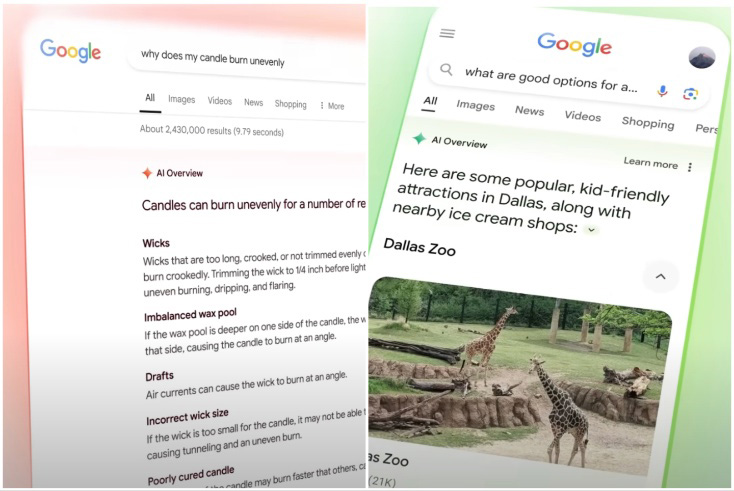Publishers say Google’s AI Overviews have reduced traffic potential

Three months since Google began rolling out AI Overviews in the UK, publishers are attempting to understand the precise impact on traffic, with some outlets reporting a substantial drop in engagement from search.
According to one publishing industry trade body representative, based on early indicators and “as a conservative ballpark”, publishers have seen 5-10% decreases in traffic from search since AI Overviews were launched amid other changes to Google’s search algorithm.
“That number will no doubt grow as we see AI Overviews becoming more prevalent for ‘keywords’ that publishers typically seek to rank for,” this person explained.
Liz Reid, Google’s head of search, has previously written that Google will “continue to focus on sending valuable traffic to publishers and creators” and that it sees “links included in AI Overviews get more clicks than if the page had appeared as a traditional web listing for that query”.
But publishers are reporting the opposite effect, with the trade body representative suggesting such statements amount to a “myth”.
Adam Vowles, director of SEO and audience development at Immediate Media, said its brands have seen drops in click-through rate from search following the institution of AI Overviews that have since “normalised”.
“Google has been making a clear direction change over the last five years to move from an index of the world’s information to an answer engine. They are trying to answer users’ questions within their own ecosystem as much as possible,” he told The Media Leader, adding that the result has been reduced traffic potential for publishers.
New audience strategies needed
Despite the strength of trust consumers place in its brands, which include Good Food and Radio Times, Vowles said, like others Immediate is “having to pivot and change our strategy in some content areas” as once-reliable how-to articles and listicles have been especially affected by AI Overviews.
AI Overviews are seemingly getting served more often in response to queries looking for “evergreen” information — such as “how to fry an egg” or “what is the best laptop for video” — that has long been reliable traffic drivers for specialist publishers.
The trade body representative told The Media Leader that one specialist publisher saw a 50% drop in traffic when these AI Overviews were being tested in their niche content area in the US market.
News outlets such as The Sun have also hinted that changes to Google’s search have severely affected site traffic. In its latest earnings results, News UK revealed that The Sun‘s digital offering saw global monthly unique users decline 40% year on year to 80m in September, from 134m a year earlier.
Meanwhile, News UK reported lower digital ad revenue across its brands — something it attributed to “a decline in traffic at some mastheads due to algorithm changes at certain platforms”.
When asked to elaborate on what specifically caused the sharp decline in traffic at The Sun and other News UK brands, the publisher declined to comment.
A spokesperson for The Sun said: “The digital landscape has experienced seismic change in the last 12 months due to well-reported platform algorithm changes, which have affected the industry as a whole. The Sun continues to innovate and invest in journalism reaching new audiences, both on and off platform.”
Other news brands, meanwhile, have indicated that while changes to search have harmed their traffic, they have made up for it by leaning in to other Google products.
For example, Press Gazette reported last week that Reach, the UK’s largest publisher, has used Google’s smartphone-based content recommendation feed, Google Discover, to drive referral traffic to great success.
Martin Little, its audience transformation director, said Discover traffic had more than compensated for a decline in traffic from standard search and is now Reach’s single-largest traffic referral source.
‘One of a number of threats’
Google has signalled that AI Overviews are unlikely to be served around news content, but how it defines “news” is unclear. Owen Meredith, CEO of the News Media Association, has previously warned that Overviews threaten the business models of journalism as they “risk discouraging users from clicking through to the original links”.
Similarweb data viewed by The Media Leader showed that numerous news-related queries had prompted an AI Overview response, even for searches that specified a publisher that the user was trying to access. These include queries such as “wsj prime rate”, referring to The Wall Street Journal, or “tropical storm helene path”, relating to news around Hurricane Helene in the US.
It is not immediately clear from Similarweb data whether AI Overviews being served for such queries have necessarily led to a decline in traffic for publishers that cover those articles.
Stuart Forrest, global director for SEO at Bauer Media’s publishing business, told The Media Leader that while AI Overviews are a concern for publishers, they are “one of a number of threats rather than the primary threat” to search traffic.
He cited the example that individuals searching for information on the US presidential election could view an updated map of electoral results, licensed and cited from The Associated Press, on Google search without needing to click into AP’s website or scroll down the page to alternative news articles.
Such search results, which typically feature “boxes” where Google displays information at the top of the page, have become more common in the past year. Google also regularly surfaces what it calls “featured snippets” that often seek to address user queries without the need for them to click on a link by quoting information from a top web result.




